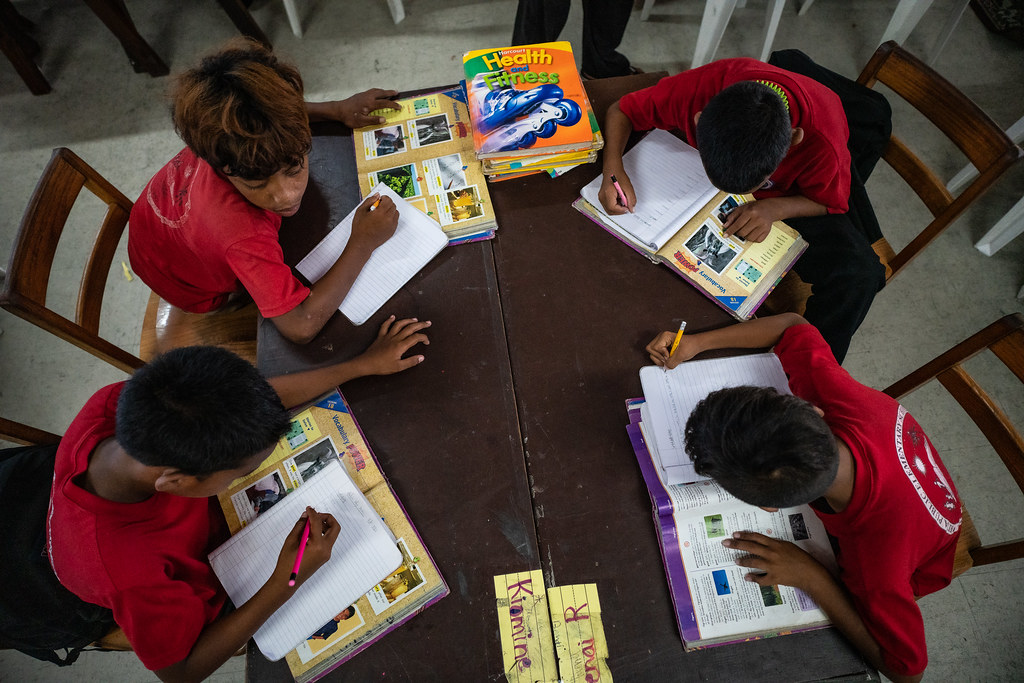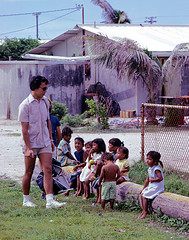RMI Education and Skills Strengthening Project
The Government of the Republic of Marshall Islands has actually received funding from the World Bank for the Education and Skills Strengthening Project (ESSP) expense. It intends to use part of the proceeds for seeking advice from services.
The consulting services (“the Services”) will assist the Project Manager and the RMI National Training Council in carrying out the World Bank-funded job successfully.
The assignment will focus on supporting the Project Implementation Unit (PIU) in developing a framework for Recognition of Prior Learning (RPL) for TVET, focused on helping the College of the Marshall Islands and the RMI National Training Council evaluate and boost the skills of employees through certified college accreditation.
The in-depth Terms of Reference (TOR) for the project are suggested in the connected Terms of Reference (ToR).
The National Training Council now invites qualified people (“Consultants”) to show their interest in providing the Services. Intrigued Consultants ought to supply information demonstrating that they have the required credentials and appropriate experience to carry out the Services (attach a Cover Letter of no greater than 4 (4) pages attending to the necessary experience and credentials requirements curriculum vitae with a description of experience in comparable tasks, comparable conditions, etc). Firms’ personnel may express interest through the utilizing company for the assignment. In such a situation, only the experience and certifications of people will be thought about in the selection procedure. The requirements for electing the Consultant are: A.
Mandatory Qualifications and Experience Master’s degree in education, training
, management, or an associated field. Minimum of 5-10 years of experience working in TVET System. Curriculum Design and Systems.
Have 2-5 years’ experience designing and
carrying out RPL. structures, policies, and procedures. A sample of previous work will be required as evidence of previous experience. Excellent communication, training, and facilitationskills. Experience with working with varied stakeholders, consisting of government. agencies, TVET organizations, companies, and students in the Pacific. B. Desired Qualifications and Experience Ability to deal sensitively in a multicultural
environment and construct effective group relationships with clients and pertinent stakeholders. The attention of interested Consultants (including companies )is drawn to paragraphs 3.14, 3.16 and 3.17 of the World Bank’s”
Procurement Regulations for IPF Borrowers “July 2016 modified November 2020” Procurement Regulations “, setting forth the World Bank’s policy on conflict of interest. Further details can be acquired at the address below throughout workplace hours, 0900 to 1700 local time. Expressions of interest must beprovided in a written kind to the address below (personally or by email )by 5:00 pm, 23rd December 2024.
The subject line must state:”National Training Council Strategic Plan Consultant -full name of the candidate”. Julius Lucky Director National Training Council!.?.!ntcdr@ntcinfo.org:Phone: 692 625-4521 Empowering Community Champions for Sustainable Development in RMI Gender Equality, Climate Resilience and Water Safety Training Majuro,
Republic of the Marshall Islands: The fourth
Women and Youth Training for
Gender Equality, Climate Change, Disaster Risk Reduction and Water Safety Management has actually just recently occurred at the University of the South Pacific’s campus in Majuro, the Republic of the Marshall Islands(RMI ). This important training was arranged by the United Nations Development Programme( UNDP )Pacific Office through the Addressing Climate Vulnerability in the Water Sector(ACWA) job. The week-long capacity-building training intended to empower females and youth with the knowledge and practices needed for climate-resilient water security management in the
Republic of the Marshall Islands(RMI ). This training strengthens a commitment to improving rmi national training council‘s water security and neighborhood durability against climate modification effects, especially females
and youth, making sure that nobody is left behind. The training welcomed individuals from all 24 atolls and featured resource speakers from federal government companies, non-governmental companies, and worldwide development partners from the RMI Environmental Protection Authority, Climate Change Directorate, Office of the Chief Secretary, Ministry of Culture and Internal Affairs, National Disaster Management Office, Women United Together Marshall Islands, RMI Human Trafficking Task Force, Waan Aelõñ in Majel, Jo-Jikum, and the International Organization for Migration. In her opening remarks, Secretary for the Ministry of Culture and Internal Affairs, Brenda Alik, highlighted the significance of collective action in building a climate-resilient nation.”It is our obligation to come together and collaborate. As we face the difficulties postured by climate modification, comprehending its impact on our water resources is important for improving the well-being of communities throughout the Marshall Islands,”she stated.
RMI Environmental Protection Authority General Manager Moriana Philip highlighted in her speech the necessary role of women and youth in addressing climate-related challenges.”This workshop joins us from different neighborhoods to deal with the pressing issues we face today, consisting of climate-related obstacles, particularly on our water resources.”We want to stress the essential role of females and youth in this task as your participation is instrumental to its success and beyond, “she said.
The first day of the workshop covered important concerns associated with gender equality, human rights, and public health within the Marshall Islands. It consisted of conversations on gender equality and mainstreaming, focusing on the impacts of climate modification on water security and the out of proportion impacts on vulnerable groups. The significance of integrating gender equality and social addition into all task aspects was likewise gone over. Human rights and human trafficking were dealt with, stressing the need for extensive protection of vulnerable populations
throughout emergencies. In addition, the workshop resolved gender-based violence, highlighting the various forms that can arise in catastrophe situations, such as domestic violence and sexual coercion. The agenda concluded with a concentrate on sanitation and health and their important role in health, incomes, school participation, self-respect, and building resilient neighborhoods. ACWA Project Manager Koji Kumamaru revealed his appreciation to all participants
, emphasizing the value of their contributions to their neighborhoods.”Women and youth are crucial to the success of the ACWA task. More notably, you are the champs and future leaders who will return to your communities to empower others,”he said. During the workshop, individuals went to Rongrong Island and examined the 15,000-gallon Flatpack Modular water tank set up at the Rongrong High School Boys Dormitory as part of the ACWA job. The installation is an essential component of the project, matched by assistance from Australia
‘s Department of Foreign Affairs and Trade. The see worked as a valuable firsthand experience of the favorable impact of the ACWA job on the community and its
water resources. Marie Naisher from Jabat Island expressed her appreciation for the chance to join the workshop and explained her desire to be part of the job when it reaches Jabat.
“This was my first time taking part in such training, and I discovered a lot from the guest speakers, group activities, and the website check out. I now understand the value of tidy water and how to sanitize it. I’m excited about the ACWA task concerning Jabat and all set to help when it gets here,”she stated. Don Kobney, an ACWA website organizer from Santo, Kwajalein, also shared his enjoyment.”The workshop and website see increased my confidence and understanding of the water tank setup.
Seeing the 15,000-gallon flatpack modular water tank firsthand offered me a clear understanding of the system, and I’m eagerly anticipating sharing this knowledge with my community, “he said. By the workshop’s end, participants were better geared up to understand environment change and its regional effects, drive adjustment and mitigation efforts, particularly in water security, and utilize new resources to affect their communities favorably. ACWA is made possible thanks to the assistance of the Green Climate
Fund, with the job co-financed by the Government of the Republic of the Marshall Islands
. The Marshall Islands: Skills Training and Vocational Education Project Assesses the performance of the task and highlights lessons. Offers inputs to two more comprehensive assessments- the local examination of ADB assistance for the Pacific and the special assessment study on Millennium Development Goals. The low instructional attainment and shortage of Marshallese skilled workers were largely due to the low quality of basic education, absence of access to education in the external islands, and weaknesses in abilities training and the vocational and technical education system.
These supported an economy marked by high unemployment because of constrained private sector development and federal government downsizing. Joblessness was particularly high amongst the youth and women in the outer islands. Suitable local competent workers for existing job vacancies were unavailable, thus the importation of appropriately competent foreign workers. Hence, there was a mismatch between readily available jobs and abilities of the Marshallese labour force. These conditions offered the initiative for the Governmentof the Marshall Islands to prioritize technical and occupation education training reforms. In 2000, ADB approved a loan for $9.1 million to improve skills training to supply well-trained workers required for sustained economic and social development. This was to be attained through an integrated national skills training system. The job included 4 parts: development of a profession awareness program, skills training enhancement, enhanced skills training chances for women and youth, and institutional fortifying. The anticipated result was increased income-generating opportunities and work for students, particularly females and youth in the outer islands. Overall, the project was rated unsuccessful. Limited progress was achieved in making the job responsive to the requirements of its recipients and private-sector companies. The enduring weakness of bad numeracy and literacy proficiencies
amongst public primary and secondary school graduates and dropouts getting in college or participating in voc-tech education could be partially attributed to the poor quality of basic education. The job was supply-driven and might not develop a strong linkage with private sector requirements or align its activities with the requirements of the labour market. The status of the technical and occupation education training system has actually stayed essentially the exact same after project conclusion. The research study put forward that ADB could encourage the Government of the Marshall Islands, through consultation and policy discussion, to follow through on the government’s
commitment to establishing a devoted labour info system to link technical and vocational education training program offerings with market need. Although the task set up a labour market info system, in the absence of internal staff capability at the National Training Council, it was not fully functional.
Please login or Register to submit your answer









